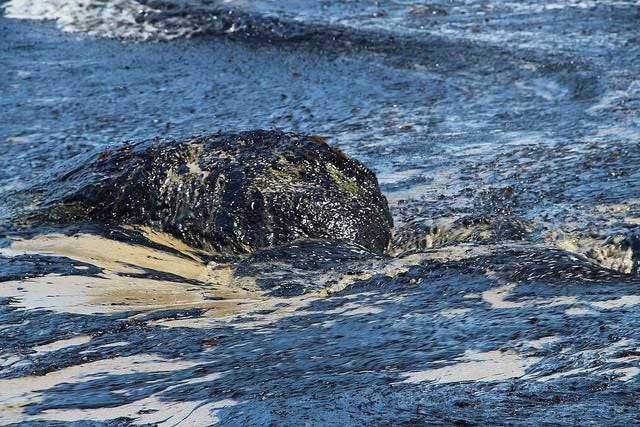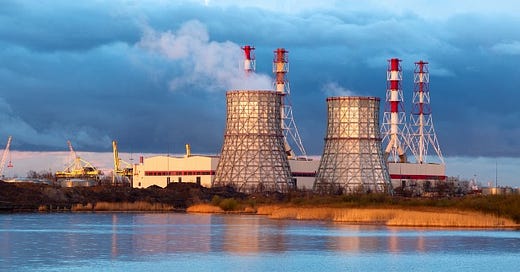Planet inches closer to energy crisis
The looming energy crisis could spell disaster for the Planet.
Happy Indigenous Peoples’ Day! And welcome to Planet Week, where we highlight the last week of environmental news and what it means for our Planet.
Last week, Tropical Cyclone Shaheen slammed into Oman and Yemen, the United Kingdom committed to 100% clean electricity by 2035, and rainfall in Italy set a European record.
In case you missed it, here’s what else happened around the Planet:

Sunday, October 3
Oil spill fouls California coast
Last weekend, an oil spill off the coast of California’s Huntington Beach forced Gov. Gavin Newsom to declare a state of emergency. The spill, which originated from a pipeline connected to an offshore oil platform, spewed 126,000 gallons of crude oil, creating a slick the size of Santa Monica.
The resulting spill didn’t just close beaches for at least a week — it threatened local wetlands and killed fish and birds. Though the pipeline has been plugged, officials are still left with more questions than answers, such as, how did we let this happen in the first place? The Los Angeles Times dives deeper.
Monday, October 4
Cities face the heat
Urban extreme heat has increased 200% since the 1980s, finds a new study that examines over 13,000 cities.
To put that in context, nearly a quarter of the global population live in urban areas where heat exposure has risen. Of those populations, poor and marginalized residents are most at risk, with two-thirds of the global heat increase in sub-Saharan Africa and southern Asia.
“This isn’t a problem of the future,” the study’s lead author, Cascade Tuholske, told Axios. “Rather, urban residents, largely in Africa and Southern Asia, have had to deal with increasingly dangerous heat for decades and the problem is just getting worse.”
Tuesday, October 5
The world’s looming water crisis
In other bad news, most countries are unprepared for a “looming” water crisis caused by population growth and climate change, according to a new World Meteorological Organization report. The report finds that up to 5 billion people will be water insecure by 2050.
Additionally, droughts, floods, and other weather-related disasters are on the rise. Last year’s unprecedented flooding in Japan, Pakistan, China, and Europe is a snapshot of what’s to come. Read more in The Washington Post.
A bad 10 years for coral
We’ve known coral reefs have been in bad shape for awhile, but new research details just how bad it is. The study, released by the Global Coral Reef Monitoring Network, finds that the Planet has lost 14% of its coral reefs in the last decade.
Rising ocean temperatures, driven by climate change, were the biggest reason for the loss. And since corals continue to struggle in a warming world, the findings outline the need for urgent climate action. Such action, combined with coral’s natural resilience, can help rebound the plummeting populations. The Guardian covers the study.
Wednesday, October 6
Google goes greener
If you use Google Maps, you may have noticed something different last week: Your suggested route defaults to the most eco-friendly. The move is part of a suite of new features — applied to Maps, Travel, Shopping, and Search — that helps users reduce carbon footprints.
“In all of these efforts, our goal is to make the sustainable choice the easier choice,” Google CEO Sundar Pichai said in a YouTube video. “Individually, these choices might feel small. But when you multiply them together across our products, they equal big transformations for the Planet.” The Verge covers the updates.
Also last week, Google and YouTube announced they will block users from monetizing climate denial on their platforms. The move helps combat climate change misinformation, which can run rampant and unchecked online. The Wall Street Journal has more.
Biden restores landmark law, 3 monuments
Though Biden’s landmark climate bills remain in limbo, the president is still pushing environmental action. Last week, his administration restored two policies that were weakened by the previous administration:
On Wednesday, the administration moved to restore the foundational National Environmental Policy Act, which requires federal agencies to consider environmental costs before starting any major projects, like highways, pipelines, and mines, The New York Times reports.
On Thursday, the administration announced it would restore three national monuments: two sprawling monuments in Utah and a marine conservation area in New England, reports The Associated Press.
Thursday, October 7
Planet inches closer to energy crisis
The looming energy crisis could spell disaster for the Planet. With lifted pandemic restrictions and colder weather, energy demand is roaring back. And countries aren’t looking to the cleanest fuel sources to feed this demand.
To meet power shortfalls in China and in India, China is boosting its coal output. Russia, which provides 40% of the European Union’s gas imports, is leveraging its position to pressure Germany and Brussels to approve a controversial pipeline. Up against this volatile gas market, European coal shot up, trading at a 13-year high.
With large-scale transitions to renewable energy, we may face more energy crises like these, as countries turn to more easily storable fossil fuels to keep up with soaring demand, reports Bloomberg.
Bonus
4-time champ
All fat bears are great. The more they eat before hibernation, the healthier they are come spring.
But this year, the choice was clear. Otis-480 has been crowned the Fat Bear Week champion for the fourth time in seven years, beating out the runner-up by 7,000 votes. Read more in Earther.
Have a great week,
Brandon and Sam






